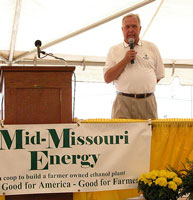Somewhat like when President Bush was in St. Louis at the Advancing Renewable Fuels Conference, a heckler got the headlines when General Motors Chairman Rick Wagoner addressed the 100th Los Angeles Auto Show this week, according to this AP report.
The man unfurled a large black-and-white contract of sorts and asked Wagoner if he would sign a pledge to be the fuel economy leader in the industry by 2010.
Wagoner, a bit taken aback, politely said that his speech about GM’s efforts to develop green technology including a plug-in hybrid vehicle should speak for itself.
A Business Week report also highlighted the spotlight-stealing environmental activist, but at least gave Wagoner’s speech almost equal time.
When the first L.A. Auto Show debuted 100 years ago, he noted, there were three competing engine technologies—electricity, steam, and gasoline. “Going forward, it is highly unlikely that oil alone is going to supply all of the world’s rapidly growing automotive energy requirements,” he said. “The key is energy diversity.”
For GM, that meant talk of flexible-fuel vehicles, ones that run on gasoline or an ethanol blend called E85. It also meant unveiling a new hybrid gas/electric GMC Yukon sport-utility vehicle and plans for a “plug-in” version of the popular Saturn Vue Green Line SUV.
California Gov. Arnold Schwarzenegger joined representatives from General Motors and other car manufacturers at the show on Thursday.
The governor challenged automakers to keep making progress in manufacturing alternative vehicles.
“The cars that are clean will be the cars of the future,” he said.
Read more from Inside Bay Area.
 Every month there’s a new record set for ethanol production and the bar has now been raised to 333,000 barrels a day. That’s a 55,000 barrel per day increase since the beginning of the year, according to the latest figures released by the Renewable Fuels Association.
Every month there’s a new record set for ethanol production and the bar has now been raised to 333,000 barrels a day. That’s a 55,000 barrel per day increase since the beginning of the year, according to the latest figures released by the Renewable Fuels Association.


 Here’s a
Here’s a  Former
Former 

 An analyst with Bunge Ltd., expects world biodiesel output to hit nearly 16 million metric tons by 2009.
An analyst with Bunge Ltd., expects world biodiesel output to hit nearly 16 million metric tons by 2009. A Singapore-based company has made a deal with
A Singapore-based company has made a deal with 


 Converting wood chips and other forestry and agricultural biomass to ethanol is the goal of an agreement between a Connecticut energy company and a Massachusettes cellulosic technology firm.
Converting wood chips and other forestry and agricultural biomass to ethanol is the goal of an agreement between a Connecticut energy company and a Massachusettes cellulosic technology firm.